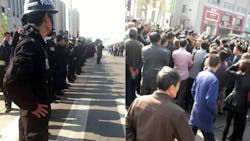Planned Chemical Plant by Sinopec Subsidiary Sparks Environmental Protests in China
An eastern Chinese city on Thursday defended a planned chemical plant after hundreds of residents demonstrated against the project, the latest in a series of environmental protests in China.
Some 200 residents of Ningbo city living near the future site of the 55.9 billion yuan (US$8.9 billion) project blocked traffic on Monday before dispersing, the local government and state media said.
Residents are concerned about the potential impact on health from the plant, which will refine oil and produce ethylene, as well as the eviction of thousands to make way for it, media reports said.
In response, officials from Ningbo's Zhenhai district, where the plant will be located, pledged to listen to citizens but warned they would punish people for upsetting social stability.
"The integrated refining project is still in the preliminary stage," the Zhenhai government said in a statement posted on its website Thursday, adding it had yet to carry out an environmental impact assessment.
It said the government would "fully listen and absorb the opinions and suggestions of the masses about the project," which is being developed by a subsidiary of state-owned chemical giant Sinopec (IW 1000/322).
Second Recent Clash over Industrial Project
In another recent protest police clashed with residents over four days, starting from last Thursday, in Yinggehai town in southern Hainan Province over the construction of a coal-fired power station.
"During the daytime most of the villagers stayed at home, but when the night came they left their houses and attacked security forces with bricks and stones," a local businessman told AFP on condition of anonymity.
An editorial in the state-run Global Times newspaper on Thursday said industrial projects were vital to the country's economy, but urged reforms to the approval process.
"The old government-dominated method of approving and constructing chemical projects is unsustainable. It needs thorough reform," the editorial said.
"The conflict will decrease only when projects receive approval from the public."
Social Media Helps Fuel Protests
Environmental pollution and perceived health threats are sparking protests across China, helped by social media which allow organizers to publicize their causes and rally others despite tight controls in the one-party state.
Earlier this year in the southwestern province of Sichuan, hundreds of protesters clashed with police over a planned metals plant in Shifang city and forced the project to be scrapped.
Copyright Agence France-Presse, 2012
About the Author
Agence France-Presse
Copyright Agence France-Presse, 2002-2025. AFP text, photos, graphics and logos shall not be reproduced, published, broadcast, rewritten for broadcast or publication or redistributed directly or indirectly in any medium. AFP shall not be held liable for any delays, inaccuracies, errors or omissions in any AFP content, or for any actions taken in consequence.
